Subrosa portrait by Amber Martindale
You have to feel sorry for anyone up for the slab this month. One half of Iron Fist‘s reviews team saw Rainbow last month and that’s pretty much it for heavy metal. There is really no need for anyone else to exist. Ritchie Blackmore, or Ricardo as he will forever be known after hearing any David Coverdale interview about the notorious grouch, did do everyone the kindness of sodding off for 20 odd years, swapping his guitar for a lyre and focussing on his minstrel show, Blackmore’s Night, but with three shows this summer he gave all a sharp lesson in just being utterly masterful. Okay, so there was no Ronnie James (clearly) and Joe Lynn Turner wouldn’t shut up about how snubbed he was at not getting an invite to man the mic, but all protestations about Ricardo’s insistence at getting the unknown Ronnie Romero on board were quickly silenced when he hit those high notes on ‘Highway Star’. Dio, Ian Gillan, JLT and of course Glenn Hughes and Graham Bonnet are pretty much the benchmark for heavy metal frontmen, and little Ronnie Romero nailed every song asked of him. From ‘Catch The Rainbow’ to ‘Child In Time’ to ‘Stargazer’ to ‘Since You Been Gone’, the gig was a ride of a lifetime. This column therefore is almost moot. We can all just give up and just listen to ‘Rising’ for all eternity while periodically watching YouTube clips from the Genting Arena show with Romero’s beaming face and Ricardo’s mighty gesticulations. Oh, wait, we’re being told there is something beyond Rainbow. Well, if you must listen to something else, well listen to this
Sabaton – The Last Stand
(Nuclear Blast)
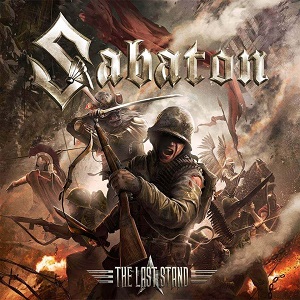
Epic. Staying in Rainbow inspired territory, from the off we’re in Manowar chanting, symphonic keys and bombastic percussion territory. It’s Sabaton o’clock and these Swedes are allergic to subtle. Since the turn of the Millennium these battle-hungry gloryhunters have been taking the path laid down by over-the-top heavy metal forefathers Priest and Helloween and setting their synth-driven cheese to the tales of war. If you frequently Youtube the songs on the completely genius kids TV show Horrible Histories and love power metal you should probably get on the Sabaton bandwagon. Joakim Brodén, who looks like a life-size Action Man, and his band of camo-trouser wearing, longhaired comrades, are the unashamed masters of metal. Like the kids gathered around a dice [Er, that would be die not dice, AD&D Dungeon Master & White Dwarf Subscriber Ed] in Games Workshop they will never be cool. But they don’t subscribe to your definition of cool anyway. They redefine the very notion of cool and their growing crowds when they play live prove this. They have their own festival for fuck’s sake. Latest album The Last Stand is about, funnily enough, last stands, each song telling the gory story of battles that while well-meaning were probably a bad idea and from 650BC Sparta to 1314 Scotland and 1877 Japan we learn, to the heaving highs of declamatory, chest-beating symphonic rock, a lesson that would please our high school history teachers. His highness the royal Yngwie once said, “How can less be more? More is more” and Sabaton are taking this mantra and running with it.
Bloody Hammers – Lovely Sort Of Death
(Napalm Records)
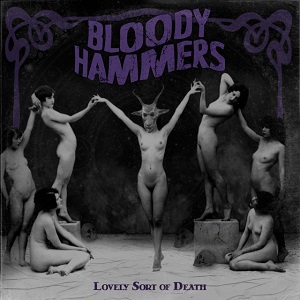
Invoked by the same ouija sesh that brought Ghost and Uncle Acid through the Helldoor and onto this mortal plane, back in 2012 Bloody Hammers were hammering the same Hammer Horror tropes filtered through a Black Sabbathian haze as a thousand other new bands. In four years the band have been steadily finding their own less schlocky path landing themselves right in the middle of Bat Country. Along the way mainman and Roy Wood lookalike Anders Manga has lost his band members (apart from organ-tinkering wife Devallia, who has stayed loyal in all her Lily Munster glory), which has meant Bloody Hammers can do what the hell he, and he alone, pleases and that is to take a left-turn away from all the doom occult cliches and just go full on goth rock. Why not? Lovely Sort Of Death sounds like it could have lent any of its ten tracks to the Crow soundtrack back in 1994. Opener Bloodletting On The Kiss apes any of those killer Nine Inch Nails ballads while later on down the line Manga delves into British post-punk, making the most of Joy Division basslines and Sisters Of Mercy dancefloor filling choruses. A touch of 1980s Bowie, a nod to Life Of Agony and some Peaceville Trio orchestral opulence and Bloody Hammers are finally making it known that their influences go way beyond Iommi and co.
Blues Pills – Lady In Gold
(Nuclear Blast)

At what point does vintage sounding rock move out of the heavy metal sphere and into the pop world? At what point does this even matter? We tQ heshers are all a bit beyond the tiresome That’s Not Metal cries of scenester mentality. So Blues Pills, from retro rock haven Örebro (home of Graveyard, Witchcraft and Truckfighters), have sidestepped their proto heavy metal beginnings and fully embraced the soul belted out by singer Elin Larsson and as such Lady In Gold happily sits side by side with records by The Gossip and Alabama Shakes moreso than Nuclear Blast label buddies Vader and Slayer. And, so what? Guitar-wielding boy-ingénue Dorian Sorriaux may be barely out of his teens but he’s always professed an obsession with Free’s Paul Kossoff and ZZ Top’s Billy Gibbons so Blues Pills were never going to be an atypical Nuke Blast band. Elin has said in interviews that she ditched her singing lessons to jam Sabbath songs in her school’s basement with the bad kids and it was there she discovered that she could belt out over loud guitars with the best of them. Two years after a stunning debut she’s back with more gospel overtones, more gently-weeping solos from Sorriaux and more driving rhythms from Messrs Anderson and Kvarnström. On album highlight ‘Gone So Long’ they sing, "Let’s see what tomorrow brings." Let’s hope it brings them the radio airplay and high profile tours they deserve. We would love to see Blues Pills transcend the heavy metal ghetto and be massive pop stars.
Hammers Of Misfortune – Dead Revolution
(Metal Blade)
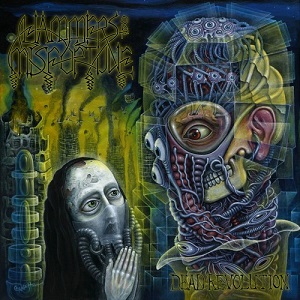
There was a level of anticipation around the release of Dead Revolution and for good reason. California’s Hammers Of Misfortune do not do albums by halves and it’s been a good five years since 17th Street, with all its Genesis homage and anti-gentrification soap-boxing. Still riled up from his involvement in the Occupy movement, Misfortune mastermind John Cobbett has channelled all his rage into Dead Revolution creating the heaviest, thrashiest prog album of all time. There are other factors to the speed metal guitars and pummelling rhythms; John and organist Sigrid Sheie alongside members of Agalloch and Yob formed crusty death metal mob Vhol, guitarist Lailah Abdul-Rauf rotted in festering slime in Vastum and drummer Will Carroll manned the kit for Death Angel. Somehow they got time to write the Hammers’ sixth album and it’s a headfuck of a masterpiece. Forming in the year 2000 when Cobbett was still with folky heavy metal sci-fi dorks Slough Feg, HOM were the even proggier, weird cousin and while they’ve earned the accolade of metal’s Pink Floyd, there are no spaced out moments of Floydian expanse here. These are Hammond frenzied, mind-melters that get the blood pumping. The chaotic melting pot builds to a mid-album crescendo with the aptly titled The Precipice (Waiting For The Crash). Bar strokes of genius from the likes of Maiden and Voivod, prog and heavy metal has always been a difficult marriage; it’s usually just bonkers nonsense or stripped of all its bite, but HOM are truly progressive and truly heavy metal. Here Comes The Sky is their one moment of Floyd magic on this album, slowing things down to a meandering moment of meditation followed by Flying Alone, the truest heavy metal song on the album, and the second best heavy metal prog song about air travel to come out recently. The album is such a triumph that not even ending on a Bob Dylan cover can throw it of its supersonic course.
Caïna – Christ Clad In White Phosphorus
(Apocalyptic Witchcraft)
Since its inception, Caïna has been an ever evolving beast; the man at the heart of the project, Andy Curtis-Brignell, has constantly sought innovation through his music and, as a result, seventh full-length Christ Clad In White Phosphorus is one of the most intense and uncomfortable sonic experiences that this outfit has produced to date. With Laurence Taylor now permanently at the helm of vocals, the metallic sounding instrumentals and razor sharp riffs provide a back drop for spiteful sounding barks and bestial shrieks. While this description may ring true of a stereotypical black metal record, the duo have crafted genuinely progressive soundscapes with the inclusion of industrial and noise elements. Members of London’s Warren Schoenbright and Dwid Hellion from the legendary Integrity, performing as Vermapyre, have contributed to this release, helping to create music that’s harsh and abrasive yet multi-tonal and filled with texture. Rather than hollow tremolo sentiments, Christ Clad… is gutsy and forward-thinking metal that entices as well as tortures. Imagine something akin to Russia’s Dernier Martyr playing over the top of Ramleh’s 1982 and you’re about halfway to describing the bleak intensity of this release. Those weak of will and faint of heart need not listen…
Dylan Carlson – Falling With A Thousand Stars And Other Wonders From The House Of Albion
(Self-release)
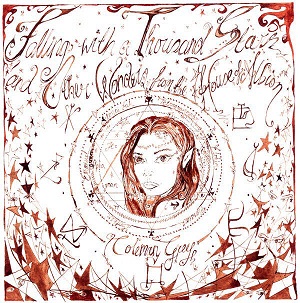
Earth mainman and godfather of drone metal, Dylan Carlson has never been shy when professing his love for British folk music and folk rock. Marrying a Brit and spending enough time over here to trawl the library at Cecil Sharp House, the North London home of English folk song and dance, Carlson has penned a love letter to his adopted country in Falling With A Thousand Stars And Other Wonders From The House Of Albion. At times his day job in Earth can crush the listener with ear-shattering dissonance, other times he lifts them to the clouds with hopeful swathes of light-tinged guitarplay. With Falling… he masterfully and gently dissects the traditional songs of England to their bare bones. The beauty of folk ballads is that you know them instinctively, as if you have heard them in your soul for generations, and Carlson’s minimal, instrumental homages are ingrained in our psyches. You may not know Ralph Vaugn Williams’ ‘Reynard The Fox’, or even Fairport Convention’s Liege And Lief version, but something about Carlson’s drone/guitar version speaks to us beyond the fabric of time. His ‘She Moved Through The Fair’ is as hypnotic as Ann Briggs’, his ‘Tam Lin’ as evocative as if Sandy Denny herself were singing over it. There is shattering majesty within this album deserving of Britain’s rich folk canon and should surely serve as Carlson’s citizenship test should he ever wish to move here completely.
Cauchemar – Chapelle Ardente
(Nuclear War Now! Productions)
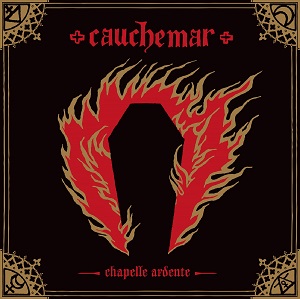
The surprise of this column comes from Canada’s Cauchemar with an album that’s really good. Really good. Listen, they’ve always been good, but more on the Cauchemar-is-another-string-on-the-bow-of-metal-renaissance-woman-Annick-Giroux rather than be stand-out-incredible. Now she’s unstoppable, because compared to 2013 debut Tenebrario, Chapelle Ardente is confident, consistent and a real contender in the pantheon of contemporary heavy metal. The ominous bells that beckon the listener are hardly a surprising nod to Black Sabbath’s first, considering she has the sleeve of said record tattooed boldly on her shoulder for all to see. She literally wears her influences on her sleeve, but beyond the Sabbathian charm, there is a devout devotion to the NWOBHM of Pagan Altar, Witchfinder General and Angel Witch. Giroux is multi-talented, she is the author of the heavy metal cookbook Hellbent For Cooking, founder of the reputable Morbid Tales fanzine, promoter of must-visit Montreal underground festival Wings Of Metal and author of Iron Fist Magazine’s travel blog World Downfall in which she recalls her travels from around the globe (from Nepal to Peru) to unearth local bands you’ve never heard of. Her love affair with heavy metal is well-known and Chapelle Ardente is sonic testament to that. Her husky tones compliment compositions that sound like a clash between Blue Oyster Cult and Mercyful Fate (how can that ever be bad?) and cult French acts like Sortilege (and not just because of the Quebecois tongue). Une reine de metal est couronné.
Inquisition – Bloodshed Across The Empyrean Altar Beyond The Celestial Zenith
(Season Of Mist)
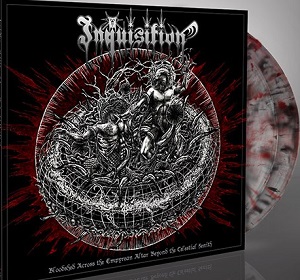
Colombian/Seattle-based black metal duo, Inquisition, return with yet another mouthful of an album title. It’s been three years since the release of Obscure Verses For The Multiverse and rumours of racism amid a string of no-shows and gig cancellations have dogged the pairing. However, this period of turbulence has in no way impeded upon Dagon and Incubus’ musical abilities as the scythe-like riffs of their seventh studio album are akin to a black metal take on Guitar Hero (played at expert level, obviously). The themes of this record congeal Satanic ideology with motifs and lyrics that border on pantheism. The repeated references to cosmic forces and astronomy allude to a spirituality that can be easy to overlook amidst the furious shredding and ‘funeral frog’ style vocals. Bloodshed is an impressive two-headed beast that plays on strengths of raw and furious technicality as well as intelligent and creative song writing. Due to the distinctive sound that Inquisition possess it would be easy for them to play themselves into a rut and stay there, however, they encompass a unique ability to remain consistently interesting and this newest release features some of their strongest compositions to date.
Salem’s Pot – Pronounce This!
(RidingEasy Records)
Not much is known about Salem’s Pot – we know they are from Sweden, we know they officially state having three band members, despite four always appearing in every picture; the rest is hidden beneath masks and layers of heavy make-up. Despite their relative anonymity, the band have managed to achieve a prolific reputation with very little output; their first demo was limited to just 50 copies and, their second, 100. This cult following caught the eye of RidingEasy, who picked them up for the release of debut album …Lurar ut dig på prärien (roughly translated to ‘luring you out to the prairie’). Since then, they’ve enjoyed extensive touring alongside a split release with American doom stalwarts, Windhand. Now the Swedes have moved onto the dreaded second album, Pronounce This! (perhaps a playful dig at fans attempting to say their first album title?) It’s a collection of six fuzzed out, vintage-sounding garage rock songs, however, while tracks such as ‘Just For Kicks’ cover the tried and tested themes of getting up to no good with Satan, there are some political messages that allude to a deeper meaning. On first glance this may come across as another horror-hopping Uncle Acid vanity project, but there is so much more to this release than that, and half the fun of listening is uncovering the mystery. Potential anarchy clad in paisley and bell bottoms.
Spirit Adrift – Chained To Oblivion
(Prosthetic)
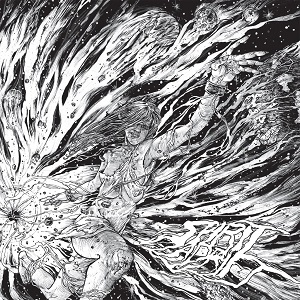
Chained To Oblivion wasn’t supposed to be the soundtrack to the current political abyss, where we’re faced with a Prime Minister who has no regard for the Human Rights act and a potential American president who has no regard for Humans at all… but if the hat fits. Following an expansive, mournful EP earlier this year, Spirit Adrift (for all intents and purposes the solo project of one Nate Garrett) have captured on the deserved attention with a full-length of five crushing passages, none shorter than seven minutes. Joining metal crusaders Windhand and Pallbearer to push the envelope for American traditional doom, Spirit Adrift have rightly caught the attention of fans of While Heaven Wept and Solitude Aeturnus, but it’s the British band Warning who are most bandied around when talking about this exciting new band. We say exciting, Garrett’s compositions are hardly likely to have you breaking out the party poppers. Warning’s weighty, funereal, measured hymns had a comforting lilt to them, almost as if they empathised with the burden of human sorrow while offering not a glimmer of hope, but a hand to guide you through the mire. Chained To Oblivion does the same. When the doomy drudge gives way to progressive swells and soaring, lush vocals, or picks up the languid pace with monumental, sludgey riffs and even tribal disco rhythms you feel a jolt of life rushing back into your blood stream, but it’s a sparse, rare moment before the comforting sorrow lets you know it’s okay to feel hopeless. Something we can all get behind at the moment.
Subrosa – For This We Fought The Battle Of Ages
(Profound Lore)
“Isn’t it good to be acquainted with darkness” sings Rebecca Vernon on Subrosa’s fourth full-length For This We Fought The Battle For Ages. It’s a theme that pulses throughout the album’s five sprawling compositions, met at the midway with a short, folk song just over a minute simply called ‘Il Cappio (The Noose)’. The haunting, sorrowful songs that shift dispiritedly around dystopian motifs taken from 1920’s sci-fi novel We by Yevgeny Zamayatin drag an avant, gothic soundscape across a stoner doom canvas creating a sense of despair that cannot be quelled. Centred around the vocal harmonies of Vernon, Sarah Pendleton and Kim Pack and the latter duo’s stirring violins, Subrosa layer their Appalachian folk over heaving, Neurosian walls of sound, building to a cacophonous climax before pulling you back down to a joyless lull of contemplative poetry. If this doesn’t sound tempting then you’re missing out on the swathes of beauty found within such caressing moments of woe. The novel from which they drew so much inspiration is about a post-apocalyptic society in which the basic human emotion of love is denied and banished, yet the album ends with ‘Troubled Cells’, a personal song written by Vernon based on restrictions within the Mormon community of her Salt Lake hometown that insists LGBT family members be disowned. Some might see that as a quick shift in theme from fantasy to reality, but it’s easy to see the correlation between the novel’s central theme of love not being a crime, but a right for all and applaud the band’s stand on tackling something so poignant. Music, even music that has the ability to break your heart, is the great healer and Subrosa have created a soundtrack for lost love and a rallying anthem that reaches to those who need to know there is hope. The album is out on August 26 and they are on tour later this year.



